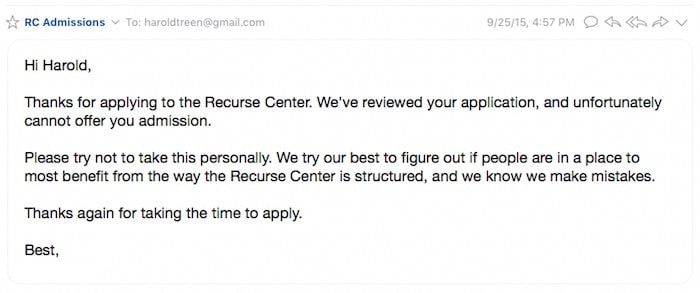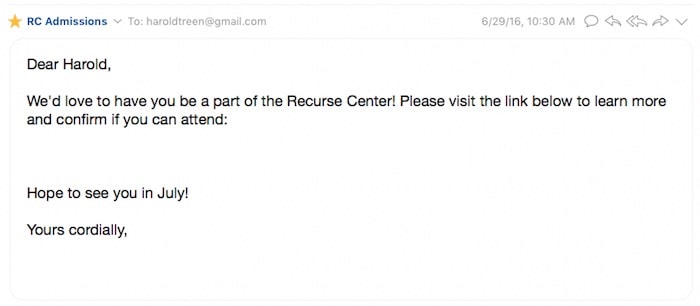Applying to the Recurse Center...twice 💌
The Recurse Center.
A free, self-directed, educational retreat for people who want to get better at programming, whether they’ve been coding for three decades or three months.
I heard about it through some well regarded friends back in 2014.
In 2015, I finally got up the courage to apply.
I was promptly rejected (literally the same day 😅).

It was both disappointing and confusing. What had I done wrong? I thought I’d be a great candidate…
- I had just finished my Computer Engineering degree.
- I had worked at numerous tech companies.
- I volunteered with diverse, tech focused organizations.
But I swallowed my pride and moved on.
Fast-forward to June, 2016. ⏩
I was travelling South America, working on some side projects and starting to crave a better coding atmosphere. Willing to try anything, I decided to reapply to RC.
A few days later I was invited to interview over Skype.
Then came an invitation to a pair programming interview.
…then came an acceptance email! ❤️

In Fall 2016, I had the joy of attending a 12-week batch at the Recurse Center.
Diffing my applications
While at RC, I learned that you can actually look back at past applications. I pulled up my first and second to see what had changed between the two.
Here’s my first application.
Here’s my second application.
I definitely think my second attempt was an improvement.
Here’s some quick thoughts on how my application changed.
Disclaimer: I don’t recruit for RC and have no insight on my applications performance. These are mere humble thoughts. 🤔
Code CracklePop
I think both answers are acceptable.
The first decouples message generation from message printing, BUT prints the number on every iteration - which is WRONG. (See problem description)
The second is a short function that does everything it needs to do.
I think we all know why Harold got rejected now. Case closed!
Please link to a program you’ve written from scratch.
I referenced the same project in both applications. In the first I tried talking it up whereas in the second I just left the link and a description.
I worked on that project more after my first application, so it may have been more complete the second time it was reviewed…
What is the most fascinating thing you’ve learned in the past month?
First application I was obviously trying to appear as sentimental as possible 😅. References a bunch of vague stuff like “being vulnerable” and “connection”
Second application felt a lot more real. It was a specific and unique thing I’d just learned about myself while travelling.
What do you want to be doing in two years?
Kinda funny how similar these two are in places! Both talk about building communities.
I feel like the second was more specific and direct. It includes a reference to external viewing material and avoids vague phrases like:
“I want to be working for a company/organization with a strong culture…”
Powerful words… identity shaking, earth shattering words…
Why do you want to attend the Recurse Center?
I think this is where I lost a lot of points.
From my first application:
For the past 4 years I’ve been doing a lot of work with software, but 90% driven by the organizations and groups I was working with.
Not. A. Good. Reason.
The Recurse Center is 100% self-directed. This sentence basically says.
I’ve been coding for 4 years and never built anything in my spare time. I only code when I’m employed.
Compare this to my second application:
Because for the last 5 months I’ve been working on projects in awful environments.
So. Much. Better.
- I’ve actually been working on things. By myself.
- I’m working in really poor environments. Coming to RC isn’t just about “time to work on stuff”, it’s about needing a better physical space.
What would you like to work on at the Recurse Center?
I listed my ebook building tool in both applications!
The first time I applied, it was just an idea. I also included a bunch of random explanation as to why I wanted to build it.
The second time it was a fairly mature project. I also had specific improvements.
Talking about my desire to experiment with content extraction algorithms also demonstrated an interest in more theoretical concepts. Having a balance between practical and theoretical is important.
I’m not sure if past applications are referred to, but if they are, demonstrating the progress made on my previous idea probably looked good.
Describe your programming background in a few sentences.
My first application contained more than “a few” sentences 😬. It was more like a origin story of entering programming and all the random organizations I’d been a part of.
My second application was much cleaner. A list of specific technologies that showed a wide range of experience.
A+ instruction following 👍.
Have you worked professionally as a programmer?
It’s interesting to note that the first word is the same between both applications, but the punctuation is different.
- Application #1: “Yes!”
Translation: “I’m not sure if I’m qualified for RC, so please accept this extra enthusiasm in lieu of reasons for admitting me!” - Application #2: “Yes.”
Translation: “You probably have a million of these to read, so I’ll keep it brief.”
First application had more superfluous details. Second application listed past positions and focuses much more succintly.
Do you have a Computer Science degree or are you seeking one?
In both I just mention my degree, but I love how first Harold also included the exact geographic location of the University.
Final thoughts
It’s easy to laugh about these things now, but being rejected from RC is hard.
In a job application, you might get rejected because of a technical shortcoming.
In a RC application, it feels like a personal shortcoming.
But if you have been rejected from RC, don’t give up.
RC’s own website states that 6% of RCers apply at least twice. I met multiple such people during my batch - they were wonderful.
Keep programming, keep working on side projects and keep striving to be a better programmer.
Looking back, I’m actually glad I got rejected.
Self-directed work is not easy. Learning that skill before going helped me get the most out of my experience. South America was also a much cheaper place to learn than New York.
But I’m also glad I reapplied.
It was an awesome 12-weeks of becoming a better programmer and a better person.
If you’re curious about what I got up to, I wrote up a whole summary.
Now that you understand there’s nothing to lose, maybe you should consider applying! 😉